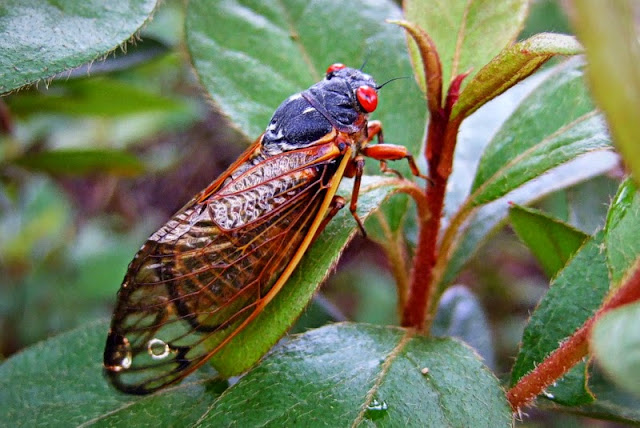If you go down to the woods today
you're sure of a big surprise.
If you go down to the woods today
you'd better go in disguise
These words are from the lyrics of the children's song
"The Teddy Bears' Picnic" written by Jimmy Kennedy in 1932.
I thought of this song yesterday as I was sitting in my swing enjoying a few peaceful moments. I realized that the normally quiet woods was not so quiet. The only sounds I usually hear from the woods is the wind in the trees, the songs of the birds, and the babbling of the small creek. A different sound had entered the woods. A strange and unusual whirring, like millions of tiny drills.
It took me a moment to place this sound. Suddenly it registered. I knew what had invaded the quiet woods. I knew what was out there and knew what to look for. As I went into the house to get my camera, I spotted the first one . . . a magicicada.
These cicadas only surface every thirteen years and this is the year that this brood of cicadas is hatching. They spend almost their entire life underground. When the temperatures warm up in late April the immature cicadas open up holes in the soil. In early May the cicada nymphs, which are brown and wingless, emerge from the soil and climb up on tree trunks or other objects and shed their exoskeletons. Cicadas aid their host tree by aerating the soil when they emerge. Not only do they aerate the soil, but those unfortunate enough to be caught provide quite the tasty dinner for birds. These cicadas only live about three weeks after they burrow out of the ground. They mate, lay eggs, and then their life is finished.
I saw two things that I have never seen before. The first is a cicada still in it's hard shell climbing up a tree. I've only seen empty shells.
I've also never seen the cicada emerging from it's exoskeleton. When they emerge they are white in color. Gradually their bodies become a darker color. It's skin will eventually turn black and orange.
After they emerge they leave their shell-like skins behind. I remember as children we used to find these shells and stick them onto each other's clothing. Of course, we did an awful lot of squealing and screaming!
The males will begin "singing" a few days after shedding their exoskeletons and expanding their wings. The males have membranes in their abdomen called "tymbals" that vibrate quickly and create amazing songs. They sing to attract the female. Their singing is the strange and unusual whirring I heard in the woods.
We have annual cicadas which are different from theses periodical cicadas. They are sometimes called "dog-day cicadas" because they merge late in the summer. There are fewer of them and they are a green coloration. The periodical cicadas have black bodies and large red eyes.
Although it looks like they have quite the stinger, they do not sting or bite. Their feet can pinch a little bit if one lands on you, but that is all.
I did a little research and one very interesting bit of folk lore is attached to them. On some of the cicadas you can either find the letter "W" or the letter "P" on their wings. The letter "W" stands for WAR and the letter "P" stands for PEACE. Look closely at the photo below and you can see the letter "W" on it's wing. I looked but never found the letter "P." As the article said, there's always a war going on somewhere!
Sometimes nature is not so beautiful and even a little scary like these insects, but nature is always amazing and fascinating. In my reading I discovered that this brood was expected to emerge in Arkansas and several other states this year and here they are! How did they know the thirteen years was up? Amazing!
I hope I haven't run you off or given you the shivers. Here's a bit of information that may make us all feel better about these creatures. Fried cicadas are considered a delicacy in some cultures, with a taste compared from asparagus to escargot. They are fascinating, but I'm not about to eat one!









































